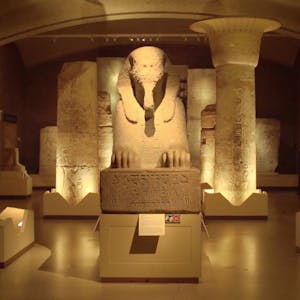Introduction to Ancient Egypt and Its Civilization
Colossal pyramids, imposing temples, golden treasures, enigmatic hieroglyphs, powerful pharaohs, strange gods, and mysterious mummies are features of Ancient Egyptian culture that have fascinated people over the millennia. The Bible refers to its gods, rulers, and pyramids. Neighboring cultures in the ancient Near East and Mediterranean wrote about its god-like kings and its seemingly endless supply of gold. The Greeks and Romans describe aspects of Egypt’s culture and history.As the 19th century began, the Napoleonic campaign in Egypt highlighted the wonders of this ancient land, and public interest soared. Not long after, Champollion deciphered Egypt’s hieroglyphs and paved the way for other scholars to reveal that Egyptian texts dealt with medicine, dentistry, veterinary practices, mathematics, literature, and accounting, and many other topics. Then, early in the 20th century, Howard Carter discovered the tomb of Tutankhamun and its fabulous contents. Exhibitions of this treasure a few decades later resulted in the world’s first blockbuster, and its revival in the 21st century has kept interest alive.
Join Dr. David Silverman, Professor of Egyptology at Penn, Curator in Charge of the Egyptian Section of the Penn Museum, and curator of the Tutankhamun exhibitions on a guided tour of the mysteries and wonders of this ancient land. He has developed this online course and set it in the galleries of the world famous Penn Museum. He uses many original Egyptian artifacts to illustrate his lectures as he guides students as they make their own discovery of this fascinating culture.
None
Syllabus
Syllabus - What you will learn from this course
Week 1
Welcome to the Course
Week 2
History and Chronology
Week 3
The Pharaoh and Kingship
Week 4
Gods and Goddesses
Week 5
The Pyramids and the Sphinx
Week 6
Mummies and Mummification
FAQ
When will I have access to the lectures and assignments?
Access to lectures and assignments depends on your type of enrollment. If you take a course in audit mode, you will be able to see most course materials for free. To access graded assignments and to earn a Certificate, you will need to purchase the Certificate experience, during or after your audit. If you don't see the audit option:
What will I get if I purchase the Certificate?
When you purchase a Certificate you get access to all course materials, including graded assignments. Upon completing the course, your electronic Certificate will be added to your Accomplishments page - from there, you can print your Certificate or add it to your LinkedIn profile. If you only want to read and view the course content, you can audit the course for free.
Is financial aid available?
Yes. In select learning programs, you can apply for financial aid or a scholarship if you can’t afford the enrollment fee. If fin aid or scholarship is available for your learning program selection, you’ll find a link to apply on the description page.
Reviews
The best and most comprehensive course I have ever attended. Thumbs up! Many Thanks to the University of Penn for such and opportunity and coursera for the access. Humbly grateful
This is a great course about Ancient Egypt. I went right into the next course "Wonders of Egypt". I also love the Penn Museum in Philadelphia which inspired me to take this course!
Interesting topics but quite difficult to follow at times due to the amount of complex words and ideas used. Would recommend to anyone prepared to spend a decent amount of time working on it.
This is indeed a great course. It is very simply put and very easy to follow up.
Do join without any hesitancy if you have a genuine interest in learning about the history of ancient Egypt!
